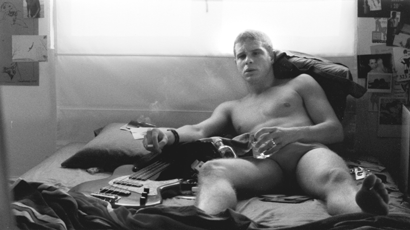Looking for love, lost in dreaming
“Two Drifters,” Portuguese writer/director João Pedro Rodrigues’ follow up to his feature debut “O Fantasma,” continues to address the filmmaker’s obsessions regarding love and sex—as well as loneliness and fantasy—with the same hypnotic quality of the previous film. If this drama is not as fiercely erotic as “O Fantasma,” it is because the filmmaker has more on his mind than the sexual gratification of the characters—even though that is integral to the story.
The film opens with Rui (Nuno Gil) kissing his boyfriend Pedro (João Carreira) goodbye after celebrating their first anniversary together, which included exchanging rings over dinner. Their happiness, however, is short-lived. Moments later Pedro is involved in a car crash, and Rui rushes to the scene of the accident as Pedro dies.
After this prologue, “Two Drifters” shifts attention away from Rui to focus on Odete (Ana Cristina de Oliveira), a young woman who works in a supermarket. Odete says she plans to have a baby she presumably conceived with her studly boyfriend Alberto (Carloto Cotta), but he rejects this decision, saying he has no immediate plans to marry her. She throws his naked ass out, and with the wind blowing through her window, learns of the death of Pedro, the son of her upstairs neighbor.
Odete attends the funeral, and starts acting strangely. She sucks the ring Rui gave Pedro off the dead man’s finger, and crying his name, throws herself onto his coffin as he’s about to be buried. Then Odete claims she’s pregnant with Pedro’s child, though his mother refuses to believe this.
Things get even weirder. Shortly after this episode, Odete returns to the cemetery on a rainy night to lie on Pedro’s grave and cry out “Fuck me, Fuck me!” as she writhes and thrusts her body on the ground. She becomes unsettlingly obsessed.
Meanwhile, Rui is seeing apparitions of Pedro while driving, and he pulls back from fully coping with his loss by having sex with strangers, and attempting suicide.
Obviously, Rodrigues is placing Odete and Rui on parallel journeys, with one character trying to deal as realistically as he can with Pedro’s death, while the other handles the loss in a more fantastical fashion. Only when these two drifters—a reference to a line in the song, “Moon River,” which plays throughout the film—find their common bond, can they begin to heal themselves and each other.
While some viewers may feel “Two Drifters” strains credibility—the main characters’ behavior is often inexplicable, making it difficult at times to care about them or become fully involved in the action—anyone willing to make the leap of faith the filmmaker asks will find this film quite powerful.
Despite many operatic moments at Pedro’s gravesite, the stories of Odete and Rui are rather intriguing. Her hysterical pregnancy is symptomatic of her loss of Alberto, and the way her psychosis is revealed is fascinating. Scenes in which she mimics having morning sickness or goes shopping for a pram are emblematic of her madness, and provide interesting counterpoints to reality.
In contrast, whereas Rui’s demons are given less screen time, his inability to visit his lover’s grave and his unexpected visions of Pedro show just how transfixed he is by the guilt he feels about his lover’s death.
Rodrigues may have issues with character and narrative, but he films “Two Drifters” beautifully, with terrific use of color and lighting. He coaxes a compelling performance from the sexy Nuno Gil, who makes Rui’s despair palpable. If Ana Cristina de Oliveira is not quite as strong in her role of Odete, at least she handles the more difficult scenes she is asked to play well.
“Two Drifters” concludes with an unforgettable episode that is at once strangely perverse and also quite beautiful. No matter what one thinks of the rest of this unusual, striking film, the ending will haunt viewers. Like “O Fantasma,” “Two Drifters” get under one’s skin and stays there for days.
gaycitynews.com



































